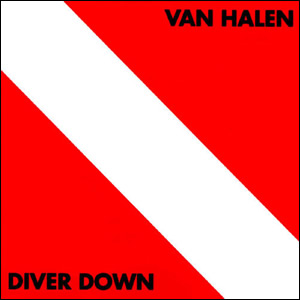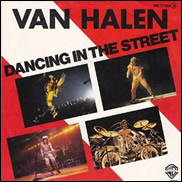Diver Down by Van Halen
 With their 5th album, Van Halen decided to take a less intense approach. Diver Down was developed by accident as the band, exhausted from constant touring and the production of four studio albums in three years, decided to put out a cover single in lieu of a new album. At the beginning of 1982, they recorded and released a cover of Roy Orbinson’s “(Oh) Pretty Woman” and it shot up to number one on the mainstream rock charts, their highest charting single to date. As no good deed goes unpunished, the band’s label (Warner Brothers) started to pressure Van Halen to record a full album to take advantage of this new level of pop fame. Eventually the band capitulated and Diver Down was recorded, mixed, mastered, and released in less than three months.
With their 5th album, Van Halen decided to take a less intense approach. Diver Down was developed by accident as the band, exhausted from constant touring and the production of four studio albums in three years, decided to put out a cover single in lieu of a new album. At the beginning of 1982, they recorded and released a cover of Roy Orbinson’s “(Oh) Pretty Woman” and it shot up to number one on the mainstream rock charts, their highest charting single to date. As no good deed goes unpunished, the band’s label (Warner Brothers) started to pressure Van Halen to record a full album to take advantage of this new level of pop fame. Eventually the band capitulated and Diver Down was recorded, mixed, mastered, and released in less than three months.
By all traditional metrics, this should be an awful album. It is a 31-minute (extremely short to be considered an “LP”) hodge-podge of cover songs, short instrumental pieces, and demos from the band’s earliest days, wrapped around just a few new original numbers. But there is an undeniable charm which makes this somehow all gel into one of the more interesting Van Halen albums. Although guitarist Eddie Van Halen admits that making the album was a lot of fun, he also states that it is his least favorite album because of all the cover songs stating, “I’d rather have a bomb with one of my own songs than a hit with someone else’s.” However, some critics have noted that cover songs, starting with “You Really Got Me” from the band’s 1978 debut album, are the perfect mechanism for the band to showcase their unique sound.
Lead vocalist David Lee Roth said the album’s title was meant to imply that “there was something going on (with the band) underneath the surface that’s not apparent to your eyes.” The simple album cover uses the marine flag to advise boats that a diver is currently submerged in the area.
 Diver Down by Van Halen |
|
|---|---|
| Released: April 14, 1982 (Warner Brothers) Produced by: Ted Templeman Recorded: Sunset Sound & Warner Studios, Los Angeles, January-March 1982 |
|
| Side One | Side Two |
| Where Have All the Good Times Gone? Hang Em’ High Cathedral Secrets Intruder (Oh) Pretty Woman |
Dancing In the Street Little Guitars Big Bad Bill (Is Sweet William Now) The Full Bug Happy Trails |
| Band Musicians | |
| David Lee Roth – Lead Vocals, Guitars, Synths, Harmonica Eddie Van Halen – Guitars, Keyboards, Vocals Michael Anthony – Bass, Vocals | Alex Van Halen – Drums |
|
The album begins with a driving cover of the Kinks 1965 song “Where Have All the Good Times Gone.” Roth pointed out that the band learned to play in their barroom days by covering a whole bunch of Kinks songs from a compilation album he owned. “Hang ‘Em High Dave” is a reworked version of a 1977 song called “Last Night”, and is the song which most reflects back to the traditional Van Halen song with fast pace driven by drummer Alex Van Halen. Eddie Van Halen has lamented that the recorded version of his solo is sub-par to his typical live performance.
Eddie’s first solo instrumental on the album is “Cathedral”, which got its name because he thought the volume-knob effects he used created something similar to the sound of “a Catholic church organ.” This acts as an intro to the fantastic original “Secrets”, the best song on the album. Here the true talent of Van Halen is best showcased in this calm and subtle setting which highlights Roth’s melodic vocals and Eddie Van Halen’s crisp and biting guitar solo. The song, which has been described as the “lightest” the band has ever recorded, has the quality of being at once a melancholy and hopeful.
“(Oh) Pretty Woman” was the first song for which Van Halen made a video to be played on the new MTV network, and in turn the video became the first to be banned by that network because of its portrayal of the as the “almost theological figure” of a Samurai warrior and because a woman (later revealed to be a drag queen) appears to be molested throughout the video. Roth directed the video but found that the single version of the song was much too short to be compatible, so he composed an intro to the song on synthesizer called “Intruder” and the band recorded it as part of the album.
 “Dancing In the Street” was the cover song originally intended to be the single at the beginning of 1982, but Eddie Van Halen was having trouble coming up with a signature riff for the song and “(Oh) Pretty Woman” fit that goal much more easily. When the band decided to do a full album, Eddie revisited this song and came up with some interesting synth effects, giving it an almost “updated disco” feel. This is also one of the few songs on the album which displays the signature backing vocals of Eddie Van Halen and bassist Michael Anthony. The last true highlight of the album is “Little Guitars”, which was actually split into two tracks on the original album with Eddie Van Halen playing a flamenco acoustic intro. The song proper is driven by a steady drum beat that backs up several riff variations before settling in with a choppy riff and more interesting rudiments and passages throughout the song.
“Dancing In the Street” was the cover song originally intended to be the single at the beginning of 1982, but Eddie Van Halen was having trouble coming up with a signature riff for the song and “(Oh) Pretty Woman” fit that goal much more easily. When the band decided to do a full album, Eddie revisited this song and came up with some interesting synth effects, giving it an almost “updated disco” feel. This is also one of the few songs on the album which displays the signature backing vocals of Eddie Van Halen and bassist Michael Anthony. The last true highlight of the album is “Little Guitars”, which was actually split into two tracks on the original album with Eddie Van Halen playing a flamenco acoustic intro. The song proper is driven by a steady drum beat that backs up several riff variations before settling in with a choppy riff and more interesting rudiments and passages throughout the song.
Unfortunately, the weakest material on the album is reserved for its conclusion. “Big Bad Bill (Is Sweet William Now)” was done as a laugh when Roth recorded a radio broadcast with the original 1924 version of he song. The Van Halen’s enlisted their father Jan Van Halen to play clarinet on the song. “The Full Bug” sounds unfocused and incomplete with the only true highlight being the short acoustic intro by Roth. The album concludes with the joke “Happy Trails”, a fully vocal performance of the Dale Evans stand, that actually breaks down to laughter near the end.
The band’s previous album, 1981’s Fair Warning was a dark and intense record and Diver Down acted as an almost polar opposite counterpart to lighten the mood. This album also brought the band to a wider commercial audience, setting the stage for their blockbuster album, 1984.
~
Part of Classic Rock Review’s celebration of 1982 albums.
NOTE: Modern Rock Review reviewed Van Halen’s new album today, A Different Kind of Truth.





Audioslave 2002 Debut | Modern Rock Review
June 11, 2022 @ 7:18 am
[…] Highway” starts with good sustain effects, similar to those used by Eddie Van Halen on the 1982 track “Cathedral” before it breaks into a an almost Outlaw Country rhythm and feel with some acoustic and twangy […]